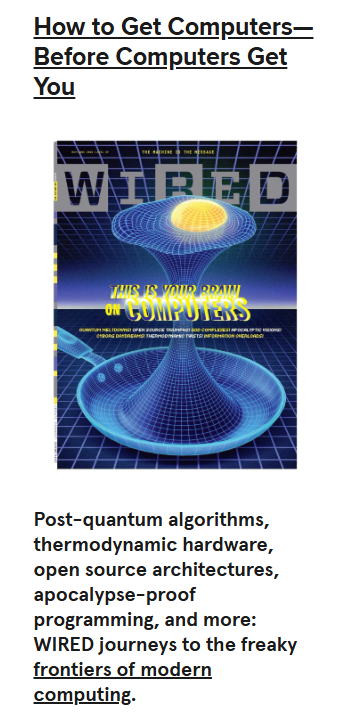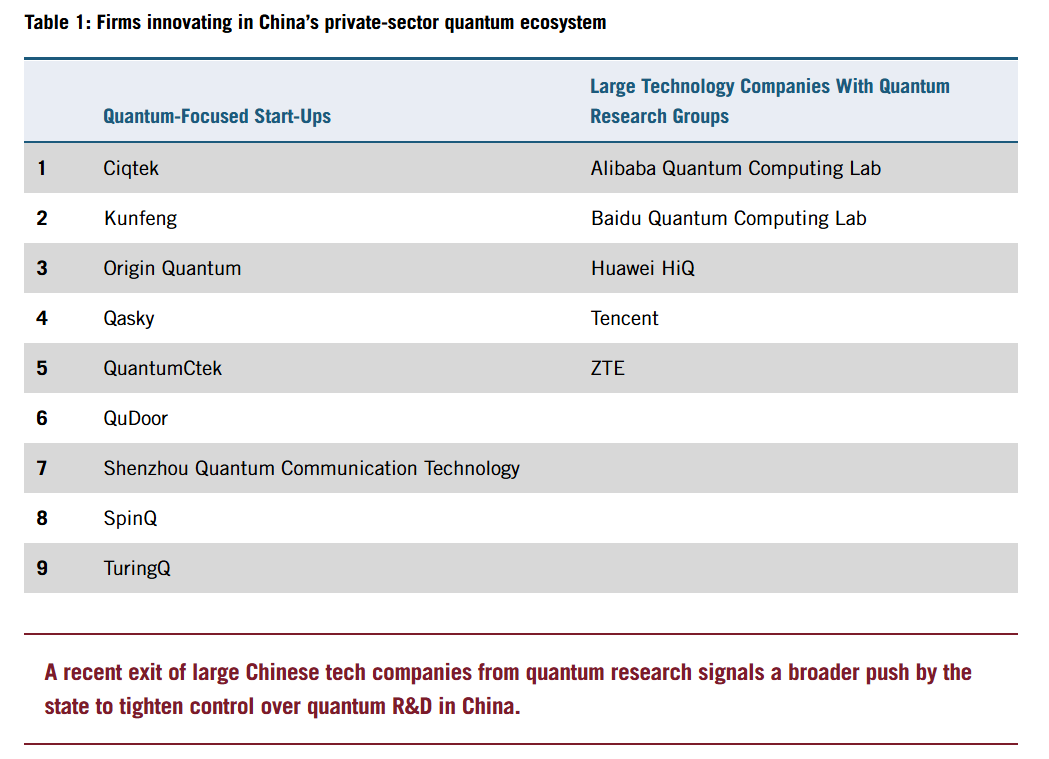Welcome to DU!
The truly grassroots left-of-center political community where regular people, not algorithms, drive the discussions and set the standards.
Join the community:
Create a free account
Support DU (and get rid of ads!):
Become a Star Member
Latest Breaking News
Editorials & Other Articles
General Discussion
The DU Lounge
All Forums
Issue Forums
Culture Forums
Alliance Forums
Region Forums
Support Forums
Help & Search
General Discussion
Related: Editorials & Other Articles, Issue Forums, Alliance Forums, Region ForumsThe Quantum Apocalypse Is Coming. Be Very Afraid

What happens when quantum computers can finally crack encryption and break into the world’s best-kept secrets? It’s called Q-Day—the worst holiday maybe ever.
https://www.wired.com/story/q-day-apocalypse-quantum-computers-encryption
https://archive.ph/FpZcr

One day soon, at a research lab near Santa Barbara or Seattle or a secret facility in the Chinese mountains, it will begin: the sudden unlocking of the world’s secrets. Your secrets. Cybersecurity analysts call this Q-Day—the day someone builds a quantum computer that can crack the most widely used forms of encryption. These math problems have kept humanity’s intimate data safe for decades, but on Q-Day, everything could become vulnerable, for everyone: emails, text messages, anonymous posts, location histories, bitcoin wallets, police reports, hospital records, power stations, the entire global financial system.
“We’re kind of playing Russian roulette,” says Michele Mosca, who coauthored the most recent “Quantum Threat Timeline” report from the Global Risk Institute, which estimates how long we have left. “You’ll probably win if you only play once, but it’s not a good game to play.” When Mosca and his colleagues surveyed cybersecurity experts last year, the forecast was sobering: a one-in-three chance that Q-Day happens before 2035. And the chances it has already happened in secret? Some people I spoke to estimated 15 percent—about the same as you’d get from one spin of the revolver cylinder.
The corporate AI wars may have stolen headlines in recent years, but the quantum arms race has been heating up too. Where today’s AI pushes the limits of classical computing—the kind that runs on 0s and 1s—quantum technology represents an altogether different form of computing. By harnessing the spooky mechanics of the subatomic world, it can run on 0s, 1s, or anything in between. This makes quantum computers pretty terrible at, say, storing data but potentially very good at, say, finding the recipe for a futuristic new material (or your email password). The classical machine is doomed to a life of stepwise calculation: Try one set of ingredients, fail, scrap everything, try again. But quantum computers can explore many potential recipes simultaneously.

So, naturally, tech giants such as Google, Huawei, IBM, and Microsoft have been chasing quantum’s myriad positive applications—not only for materials science but also communications, drug development, and market analysis. China is plowing vast resources into state-backed efforts, and both the US and the European Union have pledged millions in funding to support homegrown quantum industries. Of course, whoever wins the race won’t just have the next great engine of world-saving innovation. They’ll also have the greatest code-breaking machine in history. So it’s normal to wonder: What kind of Q-Day will humanity get—and is there anything we can do to prepare?
snip

11 replies
 = new reply since forum marked as read
Highlight:
NoneDon't highlight anything
5 newestHighlight 5 most recent replies
= new reply since forum marked as read
Highlight:
NoneDon't highlight anything
5 newestHighlight 5 most recent replies
The Quantum Apocalypse Is Coming. Be Very Afraid (Original Post)
Celerity
Friday
OP
justaprogressive
(3,189 posts)1. Ctech Astronomy
the anagram...![]()
BoRaGard
(4,657 posts)5. I for one do not welcome our new subatomic overlords
Volaris
(10,796 posts)11. I got it, were on the same page :)
Johnny2X2X
(22,594 posts)2. Post quantum cryptography already exists
It's a matter of delpoying it. Like most new technology, the US military will have it deployed very soon, the rest of the world will be a decade or 2 behind.
Bettie
(18,085 posts)3. The US military
is under the control of madmen.
Celerity
(48,925 posts)4. NIST Releases First 3 Finalized Post-Quantum Encryption Standards

https://www.nist.gov/news-events/news/2024/08/nist-releases-first-3-finalized-post-quantum-encryption-standards

August 13, 2024
GAITHERSBURG, Md. — The U.S. Department of Commerce’s National Institute of Standards and Technology (NIST) has finalized its principal set of encryption algorithms designed to withstand cyberattacks from a quantum computer.
Researchers around the world are racing to build quantum computers that would operate in radically different ways from ordinary computers and could break the current encryption that provides security and privacy for just about everything we do online. The algorithms announced today are specified in the first completed standards from NIST’s post-quantum cryptography (PQC) standardization project, and are ready for immediate use.
The three new standards are built for the future. Quantum computing technology is developing rapidly, and some experts predict that a device with the capability to break current encryption methods could appear within a decade, threatening the security and privacy of individuals, organizations and entire nations.
“The advancement of quantum computing plays an essential role in reaffirming America’s status as a global technological powerhouse and driving the future of our economic security,” said Deputy Secretary of Commerce Don Graves. “Commerce bureaus are doing their part to ensure U.S. competitiveness in quantum, including the National Institute of Standards and Technology, which is at the forefront of this whole-of-government effort. NIST is providing invaluable expertise to develop innovative solutions to our quantum challenges, including security measures like post-quantum cryptography that organizations can start to implement to secure our post-quantum future. As this decade-long endeavor continues, we look forward to continuing Commerce’s legacy of leadership in this vital space.”
snip
Hugin
(35,949 posts)7. Good follow up article, Celerity. n/t
Hugin
(35,949 posts)6. I dropped by to say exactly this. n/t
Sympthsical
(10,435 posts)9. Relatedly from the other day
https://dailygalaxy.com/2025/03/scientists-turn-light-into-a-supersolid-form-for-the-first-time-a-quantum-physics-revolution/
In a groundbreaking experiment, researchers have successfully transformed light into a supersolid, an unusual state of matter that exhibits properties of both a solid and a fluid. This discovery published in Nature, achieved by a team of physicists and nanotechnologists, opens new avenues for quantum mechanics, photonics, and advanced materials research.
. . .
This is the first time a supersolid has been created using light, which could lead to new ways of manipulating photonic materials and quantum systems.
Unlike previous experiments requiring ultracold atoms, the light-based supersolid might be more stable and controllable, making it an ideal platform for future quantum computing and optical technologies.
Quantum computing could benefit significantly from this discovery, as supersolid-based photonic systems may provide a more stable foundation for qubits, the building blocks of quantum information.
The next 25 years are going to be wild.
In a groundbreaking experiment, researchers have successfully transformed light into a supersolid, an unusual state of matter that exhibits properties of both a solid and a fluid. This discovery published in Nature, achieved by a team of physicists and nanotechnologists, opens new avenues for quantum mechanics, photonics, and advanced materials research.
. . .
This is the first time a supersolid has been created using light, which could lead to new ways of manipulating photonic materials and quantum systems.
Unlike previous experiments requiring ultracold atoms, the light-based supersolid might be more stable and controllable, making it an ideal platform for future quantum computing and optical technologies.
Quantum computing could benefit significantly from this discovery, as supersolid-based photonic systems may provide a more stable foundation for qubits, the building blocks of quantum information.
The next 25 years are going to be wild.
uponit7771
(92,630 posts)10. More "big data", "cloud savings", "crypto processing", "AI jobs" over promising under delivering from tech bros